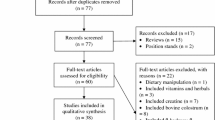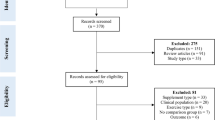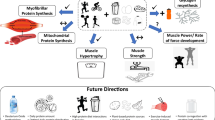Abstract
Background
Protein supplements are consumed frequently by athletes and recreationally active adults for various reasons, including improved exercise performance and recovery after exercise. Yet, far too often, the decision to purchase and consume protein supplements is based on marketing claims rather than available evidence-based research.
Objective
The purpose of this review was to provide a systematic and comprehensive analysis of the literature that tested the hypothesis that protein supplements, when combined with carbohydrate, directly enhance endurance performance by sparing muscle glycogen during exercise and increasing the rate of glycogen restoration during recovery. The analysis was used to create evidence statements based on an accepted strength of recommendation taxonomy.
Data Sources
English language articles were searched with PubMed and Google Scholar using protein and supplements together with performance, exercise, competition, and muscle, alone or in combination as keywords. Additional articles were retrieved from reference lists found in these papers.
Study Selection
Inclusion criteria specified recruiting healthy active adults less than 50 years of age and evaluating the effects of protein supplements in combination with carbohydrate on endurance performance metrics such as time-to-exhaustion, time-trial, or total power output during sprint intervals. The literature search identified 28 articles, of which 26 incorporated test metrics that permitted exclusive categorization into one of the following sections: ingestion during an acute bout of exercise (n = 11) and ingestion during and after exercise to affect subsequent endurance performance (n = 15). The remaining two articles contained performance metrics that spanned both categories.
Study Appraisal and Synthesis Methods
All papers were read in detail and searched for experimental design confounders such as energy content of the supplements, dietary control, use of trained or untrained participants, number of subjects recruited, direct measures of muscle glycogen utilization and restoration, and the sensitivity of the test metrics to explain the discrepant findings.
Results
Our evidence statements assert that when carbohydrate supplementation was delivered at optimal rates during or after exercise, protein supplements provided no further ergogenic effect, regardless of the performance metric used. In addition, the limited data available suggested recovery of muscle glycogen stores together with subsequent rate of utilization during exercise is not related to the potential ergogenic effect of protein supplements.
Limitations
Many studies lacked ability to measure direct effects of protein supplementation on muscle metabolism through determination of muscle glycogen, kinetic assessments of protein turnover, or changes in key signaling proteins, and therefore could not substantiate changes in rates of synthesis or degradation of protein. As a result, the interpretation of their data was often biased and inconclusive since they lacked ability to test the proposed underlying mechanism of action.
Conclusions
When carbohydrate is delivered at optimal rates during or after endurance exercise, protein supplements appear to have no direct endurance performance enhancing effect.

Similar content being viewed by others
References
Supplement Business Report. Nutr Bus J. 2012;23–4.
Erdman KA, Fung TS, Reimer RA. Influence of performance level on dietary supplementation in elite Canadian athletes. Med Sci Sports Exerc. 2006;38:349–56.
Lieberman HR, Stavinoha TB, Mcgraw SM, et al. Use of dietary supplements among active-duty U.S. Army soldiers. Am J Clin Nutr. 2010;92:985–95.
Petroczi A, Naughton CP. The age-gender-status profile of high performing athletes in the UK taking nutritional supplements: lessons for the future. J Int Soc Sports Nutr. 2008;5:2.
Erdman KA, Fung TS, Doyle-Baker PK, et al. Dietary supplementation of high-performance Canadian athletes by age and gender. Clin J Sport Med. 2007;17:458–64.
Drummond MJ, Dreyer HC, Fry CS, et al. Nutritional and contractile regulation of human skeletal muscle protein synthesis and mTORC1 signaling. J Appl Physiol. 2009;106:1374–84.
Koopman R. Role of amino acids and peptides in the molecular signaling in skeletal muscle after resistance exercise. Int J Sport Nutr Exerc Metab. 2007;17:S47–57.
Koopman R, Saris WHM, Wagenmakers AJM, et al. Nutritional interventions to promote post-exercise muscle protein synthesis. Sports Med. 2007;37:895–906.
Rasmussen BB, Phillips SM. Contractile and nutritional regulation of human muscle growth. Exerc Sport Sci Rev. 2003;31:127–31.
Tipton KD, Ferrando AA. Improving muscle mass: response of muscle metabolism to exercise, nutrition and anabolic agents. Essays Biochem. 2008;44:85–98.
Tipton KD, Wolfe RR. Protein and amino acids for athletes. J Sports Sci. 2004;22:65–79.
Ivy JI. Dietary strategies to promote glycogen synthesis after exercise. Can J Appl Physiol. 2001;26(Suppl.):S236–S45.
Gibala MJ. Protein metabolism and endurance exercise. Sports Med. 2007;37:337–40.
Betts JA, Williams C. Short-term recovery from prolonged exercise. Exploring the potential for protein ingestion to accentuate the benefits of carbohydrate supplements. Sports Med. 2010;40:941–59.
Saunders MJ. Coingestion of carbohydrate-protein during endurance exercise: influence on performance and recovery. Int J Sport Nutr Exerc Metab. 2007;17:S87–103.
Vandenogaerde TJ, Hopkins WG. Effects of acute carbohydrate supplementation on endurance performance. A meta-analysis. Sports Med. 2011;41:773–92.
Betts JA, Stevenson E. Should protein be included in CHO-based sports supplements? Med Sci Sports Exerc. 2011;43:1244–50.
Hawley JA, Gibala MJ, Bermon S. Innovations in athletic preparation: role of substrate availability to modify training adaptation and performance. J Sports Sci. 2007;25(S1):S115–S24.
Stearns RL, Emmanuel H, Volek JS, et al. Effects of ingesting protein in combination with carbohydrate during exercise on endurance performance: a systematic review with meta-analysis. J Strength Cond Res. 2010;24:2192–202.
Campbell B, Kreider RB, Ziegenfuss T, et al. International society of sports nutrition position stand: protein and exercise. J Int Soc Sports Nutr. 2007;4:8.
Rodriguez NR, DiMarco NM, Langley S. Nutrition and athletic performance. Joint position statement for the American Dietetic Association, Dietiticians of Canada and the American College of Sports Medicine. Med Sci Sports Exerc. 2009;41:709–31.
Ebell MH, Siwek J, Weiss BD, et al. Strength of recommendation taxonomy (SORT): a patient-centered approach to grading evidence in the medical literature. Amer Family Phys. 2004;69(3):548–56.
Davis JM, ALderson NL, Welsh RS. Serotonin and central nervous system fatigue: nutritional considerations. Am J Clin Nutr. 2000;72(Suppl.):573S–8S.
Fernstrom JD. Branched-chain amino acids and brain function. J Nutr. 2005;135:1539S–46S.
Meeusen R, Watson P. Amino acids and the brain: do they play a role in “central fatigue”? Int J Sport Nutr Exerc Metab. 2007;17:S37–46.
Martin WF, Cerundolo LH, Pikosky MA, et al. Effects of dietary protein intake on indexes of hydration. J Am Diet Assoc. 2006;106:587–9.
Seifert J, Harmon J, DeClercq P. Protein added to sports drink improves fluid retention. Int J Sport Nutr Exerc Metab. 2006;16:420–9.
Shirreffs SM, Watson P, Maughan RJ. Milk as an effective post-exercise rehydration drink. Br J Nutr. 2007;98:173–80.
Institute of Medicine. Dietary reference intakes for energy, carbohydrate, fiber, fat, fatty acids, cholesterol, protein, and amino acids. Washington D.C.: The National Academies Press; 2005.
Macdermid PW, Stannard SR. A whey-supplement, high-protein diet versus a high-carbohydrate diet: effects on endurance cycling performance. Int J Sport Nutr Exerc Metab. 2006;16:65–77.
Barnett DW, Conlee RK. The effects of a commercial dietary supplement on human performance. Amer J Clin Nutr. 1984;40:586–90.
McNaughton L, Bentley D, Koeppel P. The effects of a nucleotide supplement on the immune and metabolic response to short term, high intensity exercise performance in trained male subjects. J Sports Med Phys Fitness. 2007;47:112–8.
Buckley JD, Abbott MJ, Brinkworth GD, et al. Bovine colostrum supplementation during endurance running training improves recovery, but not performance. J Sci Med Sport. 2002;5:65–79.
Brinkworth GD, Buckley JD, Bourdon PC, et al. Oral bovine colostrum supplementation enhances buffer capacity but not rowing performance in elite female rowers. Int J Sport Nutr Exerc Metab. 2002;12:349–63.
Hofman Z, Smeets R, Verlaan G, et al. The effect of bovine colostrum supplementation on exercise performance in elite field hockey players. Int J Sport Nutr Exerc Metab. 2002;12:461–9.
Coombes JS, Conacher M, Austen SK, et al. Dose effects of oral bovine colostrum on physical work capacity in cyclists. Med Sci Sports Exerc. 2002;34:1184–8.
Buckley JD, Brinkworth GD, Abbott MJ. Effect of bovine colostrum on anaerobic exercise performance and plasma insulin-like growth factor I. J Sports Sci. 2003;21:577–88.
Shing CM, Jenkins DG, Stevenson L, et al. The influence of bovine colostrum supplementation on exercise performance in highly trained cyclists. Br J Sports Med. 2006;40:797–801.
Hoffman JR, Cooper J, Wendell M, et al. Effects of β-hydroxy-β-methylbutyrate on power performance and indices of muscle damage and stress during high-intensity training. J Strength Cond Res. 2004;18:747–52.
Lamboley CRH, Royer D, Dionne IJ. Effects of β-hydroxy-β-methylbutyrate on aerobic-performance components and body composition in college students. Int J Sport Nutr Exerc Metab. 2007;17:56–69.
Abel T, Knechtle B, Perret C, et al. Influence of chronic supplementation of arginine aspartate in endurance athletes on performance and substrate metabolism. Int J Sports Med. 2005;26:344–9.
Ivy JI, Res PT, Sprague RC, et al. Effect of a carbohydrate-protein supplement on endurance performance during exercise of varying intensity. Int J Sport Nutr Exerc Metab. 2003;13:382–95.
Zawadzki KM, Yaspelkis BB, Ivy JI. Carbohydrate-protein complex increases the rate of muscle glycogen storage after exercise. J Appl Physiol. 1992;72:1854–9.
Jeukendrup AE. Carbohydrate intake during exercise and performance. Nutrition. 2004;20:669–77.
Saunders MJ, Kane MD, Todd KM. Effects of a carbohydrate-protein beverage on cycling endurance and muscle damage. Med Sci Sports Exerc. 2004;36:1233–8.
Saunders MJ, Luden ND, Herrick JE. Consumption of an oral carbohydrate-protein gel improves cycling endurance and prevents postexercise muscle damage. J Strength Cond Res. 2007;21:678–84.
Romano-Ely BC, Todd MK, Saunders MJ, et al. Effect of an isocaloric carbohydrate-protein-antioxidant drink on cycling performance. Med Sci Sports Exerc. 2006;38:1608–16.
Martinez-Lagunas V, Ding Z, Bernard JR, et al. Added protein maintains efficacy of a low-carbohydrate sports drink. J Strength Cond Res. 2010;24:48–59.
Ferguson-Stegall L, McCleave EL, Ding Z, et al. The effect of a low carbohydrate beverage with added protein on cycling endurance performance in trained athletes. J Strength Cond Res. 2010;24:2577–86.
McCleave EL, Ferguson-Stegall L, Ding Z, et al. A low carbohydrate-protein supplement improves endurance performance in female athletes. J Strength Cond Res. 2011;25:879–88.
van Essen M, Gibala MJ. Failure of protein to improve time trial performance when added to a sports drink. Med Sci Sports Exerc. 2006;38:1476–83.
Laursen PB, Francis GT, Abbiss CR, et al. Reliability of time-to-exhaustion versus time-trial running tests in runners. Med Sci Sports Exerc. 2007;39:1374–9.
Osterberg KL, Zachwieja JJ, Smith JW. Carbohydrate and carbohydrate + protein for cycling time-trial performance. J Sports Sci. 2008;26:227–33.
Saunders MJ, Moore RW, Kies AK, et al. Carbohydrate and protein hydrolysate coingestion’s improvement of late-exercise time-trial performance. Int J Sport Nutr Exerc Metab. 2009;19:136–49.
Jeukendrup AE, Tipton KD, Gibala MJ. Protein plus carbohydrate does not enhance 60-km time-trial performance. Int J Sport Nutr Exerc Metab. 2009;19:335–7.
Breen L, Tipton KD, Jeukendrup AE. No effect of carbohydrate-protein on cycling performance and indices of recovery. Med Sci Sports Exerc. 2010;42:1140–8.
Valentine RJ, Saunders MJ, Todd MK, et al. Influence of carbohydrate-protein beverage on cycling endurance and indices of muscle disruption. Int J Sport Nutr Exerc Metab. 2008;18:363–78.
Toone RJ, Betts JA. Isocaloric carbohydrate versus carbohydrate-protein ingestion and cycling time-trial performance. Int J Sport Nutr Exerc Metab. 2010;20:34–43.
Laursen PB, Shing CM, Jenkins DG. Reproducibility of a laboratory-based 40-km cycle time-trial on a stationary wind-trainer in highly trained cyclists. Int J Sports Med. 2003;24:481–5.
Amann M, Hopkins WG, Marcora SM. Similar sensitivity of time to exhaustion and time-trial time to changes in endurance. Med Sci Sports Exerc. 2008;40:574–8.
Ivy JI, Goforth HW, Damon BM, et al. Early postexercise muscle glycogen recovery is enhanced with a carbohydrate-protein supplement. J Appl Physiol. 2002;93:1337–44.
vanLoon LJC. Maximizing postexercise muscle glycogen synthesis: carbohydrate supplementation and the application of amino acid or protein hydrolysate mixtures. Am J Clin Nutr. 2000;72:106–11.
Carrithers JA, Williamson DL, Gallagher PM, et al. Effects of postexercise carbohydrate-protein feedings on muscle glycogen restoration. J Appl Physiol. 2000;88:1976–82.
Jentjens RLPG, vanLoon LJC, Mann CH, et al. Addition of protein and amino acids to carbohydrates does not enhance postexercise muscle glycogen synthesis. J Appl Physiol. 2001;91:839–46.
VanHall G, Shirreffs SM, Calbet JAL. Muscle glycogen resynthesis during recovery from cycle exercise: no effect of additional protein ingestion. J Appl Physiol. 2000;88:1631–6.
Beelen M, vanKranenburg J, Senden JM, et al. Impact of caffeine and protein on postexercise muscle glycogen synthesis. Med Sci Sports Exerc. 2012;44:692–700.
Betts JA, Williams C, Boobis L, et al. Increased carbohydrate oxidation after ingesting carbohydrate with added protein. Med Sci Sports Exerc. 2008;40:903–12.
Widrick JJ, Costill DL, Fink WJ, et al. Carbohydrate feedings and exercise performance: effect of initial muscle glycogen concentration. J Appl Physiol. 1993;74:2998–3005.
Fallowfield JL, Williams C, Singh R. The influence of ingesting a carbohydrate-electrolyte beverage during 4 hours of recovery on subsequent endurance capacity. Int J Sport Nutr Exerc Metab. 1995;5:285–99.
Wong SH, Williams C. Influence of different amounts of carbohydrate on endurance running capacity following short term recovery. Int J Sports Med. 2000;21:444–52.
Tsintzas K, Williams C, boobis L, et al. Effect of carbohydrate feeding during recovery from prolonged running on muscle glycogen metabolism during subsequent feeding. Int J Sports Med. 2003;24:452–8.
Williams MB, Raven PR, Fogt DL, et al. Effects of recovery beverages on glycogen restoration and endurance exercise performance. J Strength Cond Res. 2003;17:12–9.
Betts JA, Stevenson E, Williams C, et al. Recovery of endurance running capacity: effect of carbohydrate-protein mixtures. Int J Sport Nutr Exerc Metab. 2005;15:590–609.
Niles ES, Lachowetz T, Garfi J, et al. Carbohydrate-protein drink improves time to exhaustion after recovery from endurance exercise. J Exerc Physiol. 2001;4:45–52 Online.
Millard-Stafford M, Warren GL, Thomas LM, et al. Recovery from run training: efficacy of a carbohydrate-protein beverage? Int J Sport Nutr Exerc Metab. 2005;15:610–24.
Clarkson PM, Nosaka K, Braun B. Muscle function after exercise-induced muscle damage and rapid adaptation. Med Sci Sports Exerc. 1992;5:512–20.
Betts J, Williams C, Duffy K, et al. The influence of carbohydrate and protein ingestion during recovery from prolonged exercise on subsequent endurance performance. J Sports Sci. 2007;25:1449–60.
Berardi JM, Price TB, Noreen EE, et al. Postexercise muscle glycogen recovery enhanced with a carbohydrate-protein supplement. Med Sci Sports Exerc. 2006;38:1106–13.
Rowlands DS, Thorp RM, Rossler K, et al. Effect of protein-rich feeding on recovery after intense exercise. Int J Sport Nutr Exerc Metab. 2007;17:521–43.
Rowlands DS, Rössler K, Thorp RM, et al. Effect of dietary protein content during recovery from high-intensity cycling on subsequent performance and markers of stress, inflammation, and muscle damage in well-trained men. Appl Physiol Nutr Metab. 2008;33:39–51.
Rowlands DS, Wadsworth DP. Effect of high-protein feeding on performance and nitrogen balance in female cyclists. Med Sci Sports Exerc. 2011;43:44–53.
Lacroix M, Bos C, Leonil J, et al. Compared with casein or total milk protein, digesion of milk soluble proteins is too rapid to sustain the anabolic postprandial amino acid requirement. Am J Clin Nutr. 2006;84:1070–9.
Karp JR, Johnston JD, Tecklenburg S, et al. Chocolate milk as a post-exercise recovery aid. Int J Sport Nutr Exerc Metab. 2006;16:78–91.
Pritchett K, Bishop P, Pritchett R, et al. Acute effects of chocolate milk and a commercial recovery beverage on postexercise recovery indices and endurance cycling performance. Appl Physiol Nutr Metab. 2009;34:1017–22.
Ferguson-Stegall L, McCleave EL, Ding Z, et al. Postexercise carbohydrate-protein supplementation improves subsequent exercise performance and intracellular signaling for protein synthesis. J Strength Cond Res. 2011;25:2110–1224.
Lunn WR, Pasiakos SM, Colletto MR, et al. Chocolate milk and endurance exercise recovery: protein balance, glycogen, and performance. Med Sci Sports Exerc. 2012;44:682–91.
Berardi JM, Noreen EE, Lemon PWR. Recovery from a cycling time trial is enhanced with carbohydrate-protein supplementation vs. isoenergetic carbohydrate supplementation. J Int Soc Sports Nutr. 2008;5:24.
Thomas K, Morris P, Stevenson E. Improved endurance capacity following chocolate milk consumption compared with 2 commercially available sport drinks. Appl Physiol Nutr Metab. 2009;34:78–82.
Cermak NM, Solheim AS, Gardner MSl, et al. Muscle metabolism during exercise with carbohydrate or protein-carbohydrate ingestion. Med Sci Sports Exerc. 2009;41:2158–64.
Acknowledgments
This work was supported by the US Army Medical Research and Materiel Command (USAMRMC) and the Department of Defense Center Alliance for Dietary Supplements Research. The views, opinions, and/or findings in this report are those of the authors, and should not be construed as an official Department of the Army position, policy, or decision, unless so designated by other official documentation. Citation of commercial organization and trade names in this report do not constitute an official Department of the Army endorsement or approval of the products or services of these organizations.
T.M. McLellan was supported by the Oak Ridge Institute for Science and Education through an interagency agreement between the US Department of Energy and USAMRMC.
Conflict of Interest
The authors have no potential conflicts of interest that are directly relevant to the content of this review.
Author information
Authors and Affiliations
Corresponding author
Rights and permissions
About this article
Cite this article
McLellan, T.M., Pasiakos, S.M. & Lieberman, H.R. Effects of Protein in Combination with Carbohydrate Supplements on Acute or Repeat Endurance Exercise Performance: A Systematic Review. Sports Med 44, 535–550 (2014). https://doi.org/10.1007/s40279-013-0133-y
Published:
Issue Date:
DOI: https://doi.org/10.1007/s40279-013-0133-y




